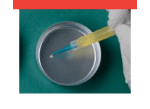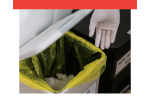Learn how to properly store, assemble and test premixed and frozen syringes for application in this video. Many Master Bond epoxies and silicones are available for packaging in premixed and frozen syringes for added convenience and ease of use.
Follow the steps in this video to ensure proper use and application.
For more detailed instructions on the assembly process for the EFD syringe please refer to this video.
![]() DOWNLOAD NOW
DOWNLOAD NOW
Download our printable step-by-step guide on using premixed and frozen syringes
Master Bond Packaging and Storage Guidelines
Select Master Bond two component systems are available for packaging in premixed and frozen syringes
- Syringe sizes include: 3 cc, 5 cc, 10 cc, 30 cc, and 55 cc
- You can request packaging for any quantity from 1 cc to 55 cc in EFD syringes
Receiving and Storing Your Shipment
- Premixed and frozen syringes are shipped with dry ice
- Upon receipt, immediately store all syringes in a freezer set at -40°C (-40°F)
Using Adhesives Packaged in Premixed & Frozen Syringes
 Testing and finding optimal thaw time
Testing and finding optimal thaw time
- Remove one syringe from the freezer to determine the optimal thaw time based on your specific application needs
- Assemble the syringe for use including screwing on the dispensing tip and inserting the manual plunger
- After waiting for a few minutes to allow the material to thaw, attempt to dispense the material
- If the material is still frozen, wait another minute and try again
- Continue this process, testing every minute, until the material reaches optimal flowability for your application
- Note the exact thaw time for future reference
Factors to Consider When Determining Thaw Time
- Environmental conditions, including the temperature of your production facility
- Viscosity requirements for your application
- Quantity of material being used (larger quantities take longer to thaw)
 Handling Remaining Material
Handling Remaining Material
Always remember to discard any remaining material once it has been removed from the freezer
Disclaimer: Please ensure that the appropriate precautions are exercised in terms of safety, health and feasibility of the techniques included here. Please note that this guide should not to be used for any specification purposes.
